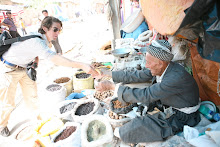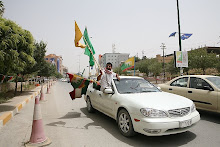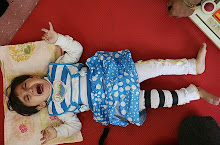Cite soleil is not a place to be trifled with and a hard place to enter. Until recently it was known as the most dangerous bario in the world, and running gun battles were continuous. It has been immortalized in various films and little aid has reached it since the earthquake. It is a dirty, impoverished shanty town and drugs are rife.
So it was with trepidation that I went in, hat pulled low, and camera hidden. I had found a guide who lived there and had offered, for a sizeable fee to show us around. In a stroke of good fortune, the man who we had prevented tattooing his eyelid was originally from soleil and his family still lived there. One of his brothers, Wally had agreed to lead us in.
The police here have made much of their success in ridding the area of bandits, including the king pin himself, Avis. Although hundreds of them escaped from prison during the quake, Avis has since died in a shoot out and most others have fled to the hills. Police have been told to fire on sight if anyone is recognized, so few have remained. They now patrol regularly, though the international troops will not go in. For my own safety I was comforted by the knowledge that only aid workers are now being kidnapped - journalists are worth a lot less. Tragically, the daughter of the head of a big charity was taken a few days ago, and there has yet been no word.
The first thing that struck me as we approached was the smell. Never in my life have I experienced such rank and foul odours as I did there. It seeped into the mouth and down to the lungs and at times I wanted to throw up. I was to afraid to offend anyone however and tried instead to hold my breath. We had left the main road and driven down a canal which was little more than a sewage dump. Yet children played in the street and foraged with dogs, while next to them lay rotting animal carcasses.
We left the bike and went in on foot. The first thing I noticed was the bullet holes littering the walls. They were sprayed across doorways and windows in what could only have been indiscriminate murder. Gang signs were on many surfaces and as we walked by people kept calling out "Kabri" and bleating. Kabri is one of the nations favourite dishes - goat and we were told it meant that we too would taste good.
Most people slouched in doorways and lazed in the shade that offered no rest from the heat. Some of them smoked drugs, others played dominos. One man idled past us with a small yellow bird that he had fashioned into a neckless using a piece of wire. It was attached by the legs and was still alive. Every face turned as we passed and stared with a mixture of curiosity and hate as if to say what right have you to observe our misery.
Despite my initial fear however everything went smoothly. We passed Avis' hide out, Wycelff's house, met the local crazy man and interviewed a few thugs. For them, nothing has changed since the quake. The area was not hit that badly and there were very few real buildings to collapse. They merely pushed their homes up again and hijacked some aid convoys.
Moving continuously we wound among the small and cluttered streets and came finally to the main road that led through the centre. More dead animals and mountains of rubbish lined the streets. It was along here that the dead were taken after the earthquake and about 10 trucks a day brought piles of bodies to be burnt in the hills. 300,000 dead estimated.
Following a harrowing couple of hours we left and went back to the hotel. It took us only 15 minutes but felt like a world away. When the devastation and poverty of Port au prince feels comforting, you know that something has changed inside.
What strikes me most is the resilience of everybody I see. They have learned over so many decades to live hand to mouth, day to day and as if each could be their last. They always make do, can sleep anywhere and most are smiling. Children play and hold your hand. They look up not with envy or anger, but with hope and more hope. They are at heart a laid back people and I believe also peaceful.
Such hope and expectation however is not always a good thing. It begins to create a reliance on foreign aid, and the general consensus here is that aid programs must encourage self sufficiency. While the west can and must provide a lot of the goods they must also avoid doling things out.
Another big problem is that a number of charities are arriving with temporary housing that is made to last for only a few years. Some has not been hurricane tested and is liable to fall apart when the rains arrive, yet the government has for some reason O.K.'d it. Everybody here knows that there is no such thing as temporary housing in Haiti, for when you give someone a structure they will stay in it till it crumbles.















































No comments:
Post a Comment